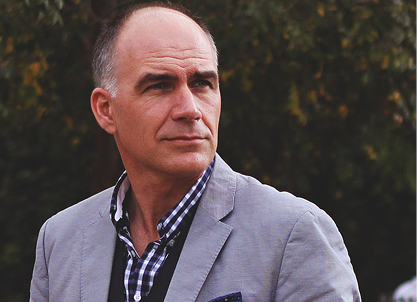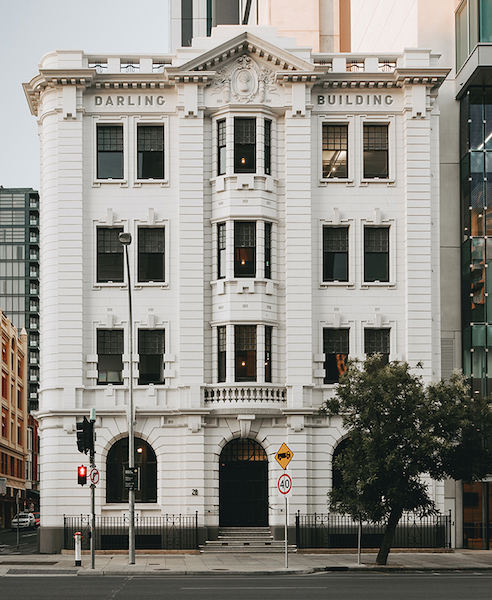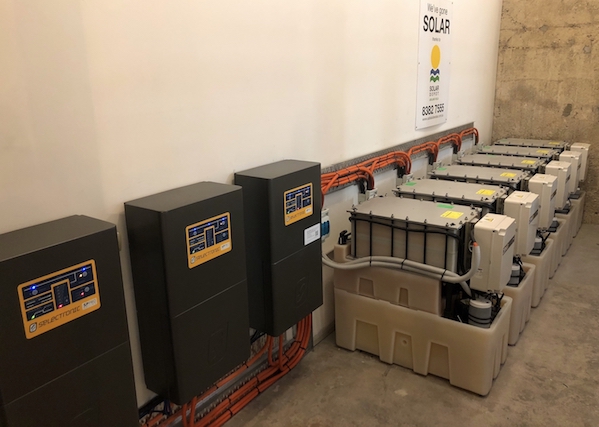 Williams Burton Leopardi director David BurtonRedflow’s ZBM2 zinc-bromine flow batteries have solved the problem of insufficient energy supply that was holding back a $4 million renovation of a heritage-listed building in central Adelaide.
Williams Burton Leopardi director David BurtonRedflow’s ZBM2 zinc-bromine flow batteries have solved the problem of insufficient energy supply that was holding back a $4 million renovation of a heritage-listed building in central Adelaide.
After architectural firm Williams Burton Leopardi bought the derelict 1916 Darling Building, largely neglected since the 1960s, they learned that the planned peak energy demand for the renovated building would require more electricity than the local power grid could supply. The peak power draw during summer was calculated at 290 amps - whereas SA Power Networks could initially supply only 150 amps, although this was later revised upwards to 200 amps.
Williams Burton Leopardi director David Burton said many solutions were so expensive they would have made the renovated building commercially unviable. “We didn’t have the space in the building for a transformer; gas would cost us hundreds of thousands of dollars and ‘winging it’ was not an option,” he said.
 Darling Building, Franklin Street, Adelaide“During a conversation with Simon Hackett, who was a client with his Base64 redevelopment, he said ‘you need a battery as a peak management system’. When we looked at it, it stacked up, so we went with a scalable energy storage system based on Redflow batteries. We have six ZBM2s now, but we can scale the system to 12 or even 18 batteries if we require them.
Darling Building, Franklin Street, Adelaide“During a conversation with Simon Hackett, who was a client with his Base64 redevelopment, he said ‘you need a battery as a peak management system’. When we looked at it, it stacked up, so we went with a scalable energy storage system based on Redflow batteries. We have six ZBM2s now, but we can scale the system to 12 or even 18 batteries if we require them.
“The main purpose of the system is to ensure that the batteries can supply energy if the building’s demand outstrips the grid’s supply capacity, so it is primarily a peak management methodology. But they are also configured to buy power at low demand times to recharge the batteries and when power spikes past a certain price, they dribble energy into the load to manage that spike down.”
The award-winning five-storey renovated Darling Building on Franklin Street now has new lighting, air conditioning systems, kitchen facilities and washing machines and dryers on each floor, as well as a fully-rebuilt heritage-listed elevator. Redflow partner Solar Depot installed the ZBM2 batteries with three Selectronic SP Pro inverters, delivering three-phase power from the building’s basement. The only notable challenge was gaining fire compliance approval from the Metropolitan Fire Service, which acknowledged that zinc-bromine flow batteries comply with all the relevant building codes concerning fire rating as they do not present the same fire risk as lithium-ion batteries.
Mr Burton said Redflow batteries were uniquely suited for the building’s needs. “For what we want to do, zinc-bromine batteries are ideal,” he said. “ZBM2s can deep cycle without damaging the battery and they embody the concept of simplicity and look quite nice in their rows.
“Lithium-ion batteries would’ve cost us a lot more to completely fire-rate the room because lithium is like putting a bomb in your basement. With the Redflow batteries, we just open the windows and a fan circulates the air.”
Mr Burton described the Redflow-based energy storage system as an “exciting opportunity” for other building projects. “One battery system could support several buildings,” he said. “With solar on the roof, you’d get a lot of power in, so it could operate as a mini storage facility and power station - if the statutory regs allow that kind of thing to start happening.”
Redflow CEO Tim Harris said the Darling Building deployment demonstrated the unique benefits provided by zinc-bromine flow batteries. “As well as their inherently non-flammable characteristics, Redflow batteries can store and discharge energy every day for years without any loss of storage capacity,” he said. “That provides a compelling value proposition for commercial customers.”
 Redflow ZBM2 batteries in the basement of Williams Burton Leopardi's Darling Building
Redflow ZBM2 batteries in the basement of Williams Burton Leopardi's Darling Building
For media assistance, call John Harris on +61 8 8431 4000 or email john@impress.com.au.
About Redflow
Redflow Limited, a publicly-listed Australian company (ASX: RFX), produces small 10kWh zinc-bromine flow batteries that tolerate daily hard work in harsh conditions. Marketed as ZCell and ZBM2, Redflow batteries are designed for high cycle-rate, long time-base stationary energy storage applications in the residential, commercial & industrial and telecommunications sectors, and are scalable from a single battery installation through to grid-scale deployments. Redflow batteries are sold, installed and maintained by an international network of energy system integrators. Redflow’s smart, self-protecting batteries offer unique advantages including secure remote management, 100 per cent daily depth of discharge, tolerance of high ambient temperatures, a simple recycling path, no propensity for thermal runaway and sustained energy delivery throughout their operating life.
Related News
- Tech veteran Patrick Tapper joins Redflow board Australian battery manufacturer Redflow Ltd has appointed experienced technology industry executive Patrick Tapper to its board of directors, just one week before its residential b...
- Conservation SA installs first ZCells for office Conservation SA CEO Craig WilkinsSA’s peak environmental organisation, Conservation SA, has installed two ZCell batteries to charge an electric car and to provide energy for ...
- Redflow manufactures complete batteries in Thailand Redflow CEO Tim Harris with completed ZBM2 batteriesAustralian energy storage company Redflow Ltd last month began manufacturing complete zinc-bromine flow batteries at its new fac...
- Redflow signs its largest global battery sale with Anaergia to supply energy storage in California The Anaergia Rialto Bioenergy Facility with an artist's representation of Redflow batteries installed Australian energy storage company Redflow Ltd (ASX: RFX) has signed an agreem...





